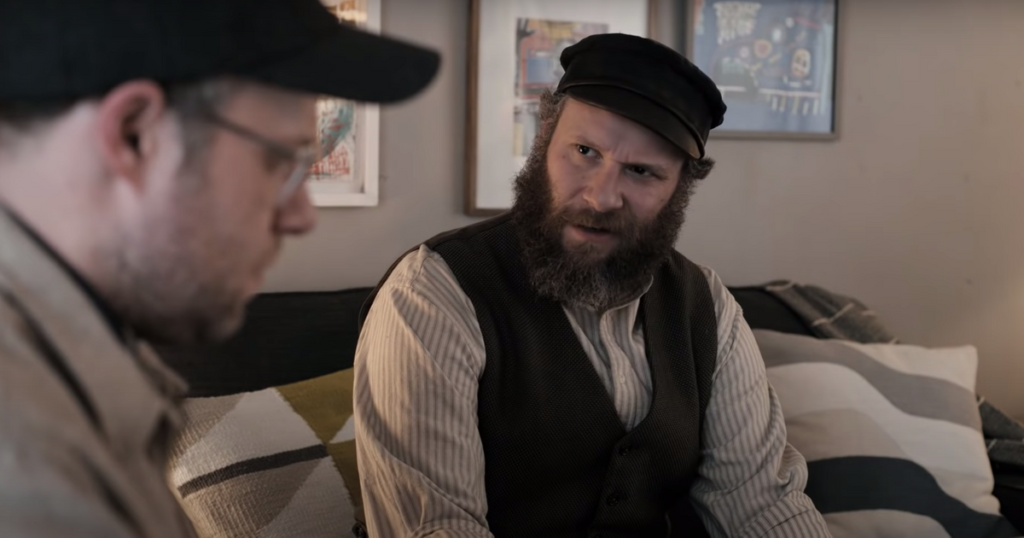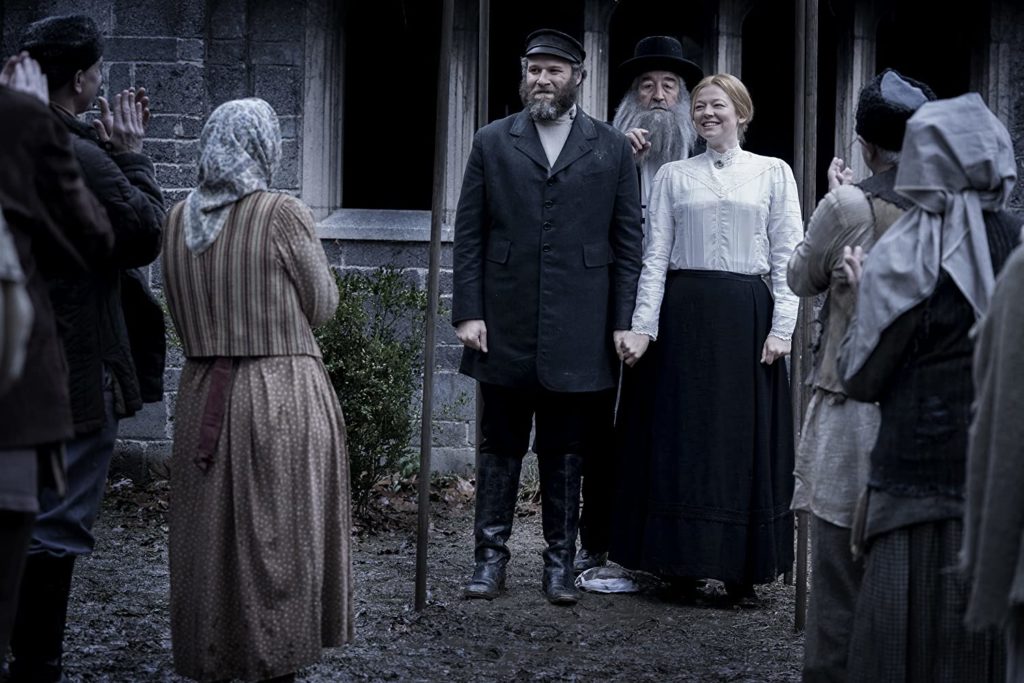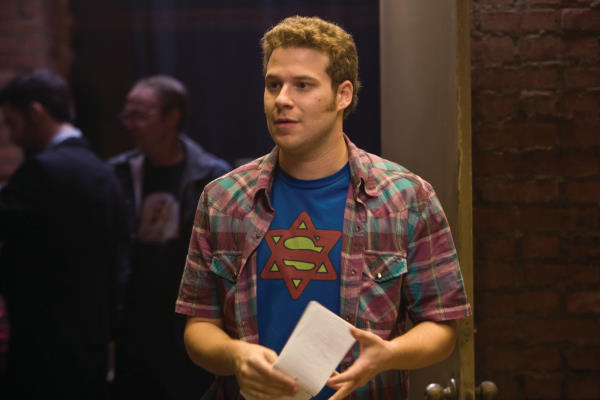
Film Review: An American Pickle
Directed by Brandon Trost. US, 2020, 88 minutes.
Available with subscription on HBO Max.
The premise of An American Pickle is a doozy, like something out of a Bernard Malamud collection: In 1919, 27-year-old immigrant Herschel Greenbaum falls into a vat of brine at the pickle factory that employs him. A century later, his body is discovered—alive and well, thanks to the preserving properties of the pickling process (luckily, he hasn’t fermented). Following examination from doctors and scientists, he’s put in touch with his great-grandson, who’s also 27 and living in Brooklyn.
That much is true for both versions of the story: the film itself and Simon Rich’s Sell Out, the novella on which it was based. But while the film pairs the “older” man (Seth Rogen) with an aspiring app developer named Ben Greenbaum (also Rogen), the original text connected Herschel with a struggling writer named Simon Rich who’s making ends meet by punching up hacky Hollywood screenplays. In that iteration, Simon’s anxious and nebbishy nature is contrasted with Herschel’s headstrong, by the bootstraps immigrant mentality, examining how the goyische American majority rejects both forms of Jewish masculinity—the former for being unassertive, the latter for being overambitious. Both end up sellouts in the end, Simon for lacking backbone, and Herschel for lacking principles beyond his drive to succeed.
An American Pickle keeps the story’s conflicts, namely Herschel’s attempts to start a pickle business and his great-grandson’s attempts to sabotage it, without any of the accompanying commentary. Ben lacks Simon’s self-hatred, at least initially, and seems to genuinely believe in the work he’s doing; his ire toward Herschel only develops once his great-grandfather’s fish-out-of-water antics lands them both in jail, ruining his chance to finance his app. Similarly, Herschel rejects Ben not really because of his emasculated bearing or his failure to fulfill the expectations of the American dream, but more simply because he disrespects the family’s legacy by refusing to properly mourn his ancestors.

The bulk of the film involves a satire of Brooklyn hipsters (who respond to Herschel’s “DIY” approach to pickling) and PC culture wars (set off by Herschel’s unfiltered Twitter account). These targets are trite and outdated, with jokes you might expect from a mid-2010s SNL sketch, but they also speak to the film’s lack of imagination regarding matters of assimilation. Herschel’s provincialism, clearly a major source of embarrassment for Ben, is only conceived in terms of his broken English and his reactionary viewpoints, and not in terms of a larger pattern of behavior. I think of the ultimate portrayal of the unrefined Jew, Jeannie Berlin in The Heartbreak Kid (1972), and how even her smallest gestures suggest her lack of acculturation.
The issue may be Rich’s choice of collaborator. Rogen is arguably the most influential Jewish movie star of the 21st century, but he’s never been a nebbish. He is, for lack of a better term, a bro, a descendant of the hippie generation whose overarching thematic concern has been male camaraderie rather than social anxiety or the angst of assimilation. Only in Funny People (2009) has he effectively played a classic Jewish neurotic, though even then the edge seems to have been taken off slightly by weed and the socializing influence of his bosom buddies. But as Ben, Rogen is neither bro nor nebbish—he’s a millennial yuppie, a role for which he is completely unsuited. A more versatile performer might have mined that incongruity for comedy, showing how his underlying Jewishness gets in the way of his attempts at pre-professionalism. But Rogen fails to develop Ben’s inner life beyond his unresolved grief over the loss of his parents, unhelped by a script that limits Ben’s non-Herschel interactions to just a few unremarkable moments.
Not only is Ben’s present defined almost entirely by his parents’ untimely passing—his past is too. Does Ben live in Brooklyn because the Greenbaums never left, or was he raised in the suburbs before returning to the newly fashionable borough? At what point did his family break from Orthodox observance? What was Ben’s relationship with his parents like before their car accident? For a film about ancestry and honoring one’s lineage, An American Pickle is altogether lacking a sense of history. The death of the elder Greenbaums provides their son with an easy emotional arc, but it also acts as a convenient way to avoid narrowing the film’s conception of Judaism, to allow for the broadest and most agreeable presentation of a complex heritage. Jewishness is not a monolithic experience, but rather a multitude of experiences, and An American Pickle refuses to commit to one. [★★]

People’s Choice
In fact, Funny People on the whole is a better tale of intragenerational Jewish confrontation than An American Pickle. The film pits Rogen, the then-new face of a particular comedic brand of immature manchild, against one of its originators in Adam Sandler, who plays a nightmare projection of himself—wildly successful but lonely and deeply insecure. More than just a cautionary tale about how money can’t buy happiness, the film critiques the very Jewish tradition of using comedy as a coping mechanism, revealing it as a way to avoid addressing the root of one’s neuroses. And the typical third-act resolutions that Rogen movies inherited from Sandler movies, in which the manchild matures and becomes a real man, are not so easily achieved here. Writer/director Judd Apatow recognizes how difficult it is to change your behavior when you spend a lifetime joking away your problems—especially when done as a way to protect against the discomfort of being treated as an other in a Christian nation.
Etan Weisfogel is a film and media critic based in Brooklyn.

